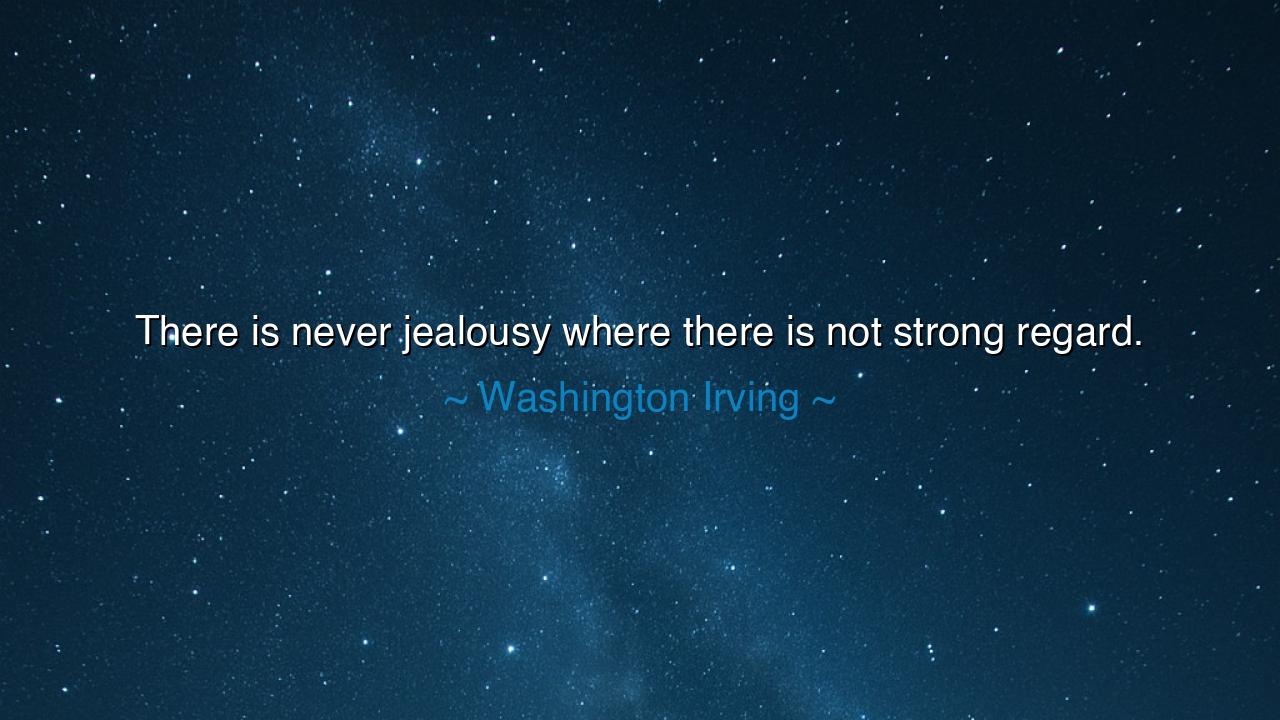
There is never jealousy where there is not strong regard.






There are insights into the human heart that endure through the ages, illuminating the nature of love, attachment, and rivalry. Among these is the wisdom of Washington Irving, who observed: “There is never jealousy where there is not strong regard.” In these words lies a profound understanding of emotion: jealousy is never born of indifference, but of deep investment. It grows only where admiration, attachment, or affection has already taken root. Irving, the chronicler of human nature and society, reminds us that jealousy, though often seen as destructive, is a mirror reflecting the depth of feeling within the soul.
To grasp the full meaning of this truth, one must understand the connection between jealousy and regard. Jealousy is not merely envy—it is the anxiety, fear, or discomfort felt when someone we cherish or respect appears threatened or diverted. It springs from care, devotion, or desire, and is absent where there is no engagement of the heart. The indifferent feel no pangs of rivalry; the detached are untouched by the fortunes or misfortunes of others. In this way, jealousy becomes a paradox: though it pains the spirit, it reveals the strength of our attachment, the depth of our admiration, and the sincerity of our regard.
The origin of this reflection lies in Irving’s study of human emotion, society, and literature. As one of the foremost early American writers, Irving observed countless interactions of affection, rivalry, and esteem. He saw that jealousy is never spontaneous—it emerges only where love, respect, or strong personal regard has already planted its roots. In the same way that a tree grows from fertile soil, jealousy grows from a heart that values, honors, and desires connection. To observe its presence is to witness the intensity of feeling, whether tender, protective, or possessive.
History is rich with examples of Irving’s truth. Consider the case of Abel and Cain, the earliest recorded brothers of humanity. Cain’s jealousy toward Abel did not arise in indifference; it was born of care twisted by envy, a reflection of the strong regard he held for God’s recognition and his own standing. The tragedy of Cain lies not in a lack of feeling, but in the corruption of that regard into fear and resentment. Irving’s insight teaches us that jealousy is a shadow cast by profound affection—it is the intensity of connection, not its absence.
In another sphere, consider the relationship between Queen Elizabeth I and her court. The jealousies and rivalries among courtiers were fueled by admiration and concern for her favor. Those who competed most fiercely were often those who held her in the highest regard, whose fortunes, ambitions, and hearts were bound to her approval. The emotion, though potentially destructive, was inseparable from deep engagement. Where attachment was weak, indifference prevailed; where regard was strong, jealousy arose as a measure of intensity.
Irving’s wisdom also carries moral instruction. To feel jealousy is to acknowledge the presence of deep care, yet one must temper it with reason, compassion, and reflection. Jealousy can harm relationships if it becomes possessive or controlling, but it can also signal the value we place on those we love or respect. Understanding that jealousy emerges from strong regard allows one to recognize the emotion’s source without being enslaved by it. Awareness transforms jealousy from a torment into insight—a guide to the depth of our attachments.
The lesson is clear and timeless: the presence of jealousy indicates what the heart treasures most. It is a call to examine both the intensity of our attachments and the wisdom with which we nurture them. We must ask ourselves whether our jealousy protects or destroys, whether it honors the bond or diminishes it. By cultivating trust, humility, and understanding, we allow strong regard to flourish without succumbing to its darker manifestations.
Thus, let Washington Irving’s words endure as a mirror of the human heart: “There is never jealousy where there is not strong regard.” Recognize in jealousy the reflection of affection, admiration, or care. Harness it as a signal of what matters most, and let it guide your actions with reason, patience, and love. For the heart that understands the source of its jealousy will act not from fear, but from wisdom, allowing strong regard to bind relationships with respect, honor, and enduring connection.






AAdministratorAdministrator
Welcome, honored guests. Please leave a comment, we will respond soon